The MIT Mystery Hunt is an annual puzzlehunt competition at the Massachusetts Institute of Technology in Cambridge, Massachusetts. It is one of the oldest and most complex puzzlehunts in the world and attracts roughly 120 teams and 3,000 contestants annually in teams of 5 to 150 people. It has inspired similar competitions at Microsoft, Stanford University, Melbourne University, University of South Carolina, University of Illinois at Urbana–Champaign and University of Aveiro (Portugal) as well as in the Seattle, San Francisco, Miami, Washington, D.C., Indianapolis and Columbus, Ohio metropolitan areas. Because the puzzle solutions often require knowledge of esoteric and eclectic topics, the hunt is sometimes used to exemplify popular stereotypes of MIT students.
The National Puzzlers' League (NPL) is a nonprofit organization focused on puzzling, primarily in the realm of word play and word games. Founded in 1883, it is the oldest puzzlers' organization in the world. It originally hosted semiannual conventions in February and September of each year, but conventions are now held annually, in July.

The Cross-Wits is an American syndicated game show which premiered on December 15, 1975, and lasted for five seasons until its cancellation on September 12, 1980. The show was hosted by Jack Clark, with Jerri Fiala as hostess. Announcing duties were handled by John Harlan, Jay Stewart, and Jerry Bishop. The show was produced by Ralph Edwards Productions and distributed by Metromedia Producers Corporation.
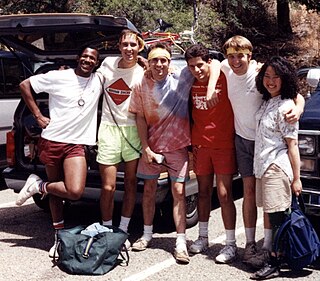
The Game is a non-stop 24- to 48-hour treasure hunt, puzzlehunt or road rally that has run in the San Francisco Bay and Seattle areas. Its teams use vans rigged with power and Internet access and drive hundreds of miles from puzzle site to puzzle site, overcoming often outrageous physical and mental challenges along the way, usually with no sleep. Teams in games have been required to walk around the roof of the Space Needle, find a puzzle hidden in a live rat, and circulate a petition to ban dihydrogen monoxide from local ecosystems while dressed in superhero outfits.

Think Fast is an American children's game show which aired on Nickelodeon from May 1, 1989, to March 30, 1990, with reruns airing weekly until June 29, 1991.

A scavenger hunt is a game in which the organizers prepare a list defining specific items, which the participants seek to gather or complete all items on the list, usually without purchasing them. Usually participants work in small teams, although the rules may allow individuals to participate. The goal is to be the first to complete the list or to complete the most items on that list. In variations of the game, players take photographs of listed items or be challenged to complete the tasks on the list in the most creative manner. A treasure hunt is another name for the game, but it may involve following a series of clues to find objects or a single prize in a particular order.

Body Language is an American game show produced by Mark Goodson Productions. The show aired on CBS from June 4, 1984, until January 3, 1986, and was hosted by Tom Kennedy. Johnny Olson announced until his death in October 1985; Gene Wood and Bob Hilton shared the announcing duties afterward, having substituted on occasion before then.
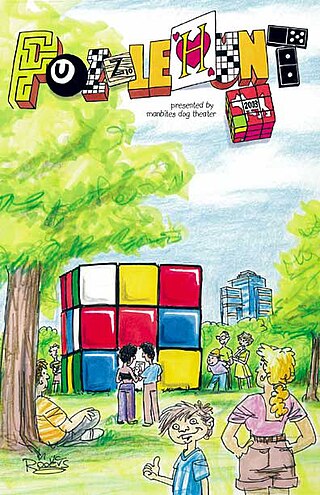
A puzzle hunt is an event where teams compete to solve a series of puzzles, many of which are tied together via metapuzzles. Puzzlehunt puzzles are usually not accompanied by direct instructions for how to solve them; figuring out the necessary approach is part of the puzzle. These hunts may be hosted at a particular location, in multiple locations, or via the internet.
The Maze of Games is a puzzlehunt and interactive multimedia novel. It started in 1995 as one of America's largest annual puzzlehunts and an offshoot of LIVE/WIRE, held at the Gen Con and Origins gaming conventions before later being adapted into a novel. The Maze of Games has been the largest event at one or both of those conventions every year since. It was created by game designers Mark Gottlieb, Mike Selinker, and Teeuwynn Woodruff. The event uses puzzle placards to lead attendees in a maze throughout the convention, and uses meta-puzzles to unite the puzzles into a final answer. The event is designed so that the thousands of attendees can all play at once. $2500 worth of electrical tape was used to create the titular "Maze" on the convention show floor.
Wheel of Fortune is an Australian television game show produced by Grundy Television until 2006, and CBS Studios International in 2008. The program aired on the Seven Network from 1981 to 2004 and January to July 2006, aired at 5:00pm from 1981 to 1989 and from 2004 to 2006 and at 5:30pm from 1989 to 2003, and is mostly based on the same general format as the original American version of the program.
Imagine Cup is an annual competition sponsored and hosted by Microsoft Corp. which brings together student developers worldwide to help resolve some of the world's toughest challenges. It is considered as "Olympics of Technology" by computer science and engineering and is considered one of the top competitions and awards related to technology and software design. All Imagine Cup competitors create projects that address the Imagine Cup theme: "Imagine a world where technology helps solve the toughest problems". Started in 2003, it has steadily grown, with more than 2 million competitors representing 150 countries in 2022. The 2023 Imagine Cup World Championship was held in Seattle, United States.
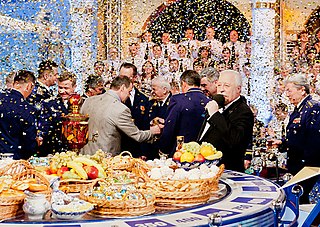
The Field of Wonders is a Soviet, later Russian adaptation of the U.S. game show Wheel of Fortune produced by VID, provided with elements of Russian culture and hosted by Leonid Yakubovich. The current rating of the show suggests it is intended for ages 16 and above, unlike the American version which is suitable for all age groups.
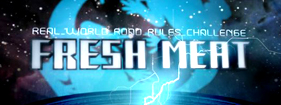
Real World/Road Rules Challenge: Fresh Meat is the 12th season of the MTV reality game show, The Challenge.

Ransom of the Seven Ships is the 20th installment in the Nancy Drew point-and-click adventure game series by Her Interactive. The game is available for play on Microsoft Windows platforms. It has an ESRB rating of E for moments of mild violence and peril. Players take on the first-person view of fictional amateur sleuth Nancy Drew and must solve the mystery through interrogation of suspects, solving puzzles, and discovering clues. There are two levels of gameplay, Junior and Senior detective modes, each offering a different difficulty level of puzzles and hints, however neither of these changes affect the plot of the game. The game is loosely based on the book The Broken Anchor (1983).
The Post Hunt was an annual puzzlehunt in Washington, DC. It was co-created by Miami Herald columnist Dave Barry, along with Gene Weingarten and Tom Shroder. The Post Hunt debuted in 2008. The most recent hunt took place on May 22, 2016. The hunt was discontinued in 2017. It was a renamed version of the Tropic Hunt, also created by Barry, Weingarten and Shroder, which had a long run in Miami, FL.

The Challenge: Fresh Meat II is the 19th season of the MTV reality game show The Challenge. Fresh Meat II is the sequel to the show's 12th season, Fresh Meat. Continuing with the precursor's advent of original contestants, Fresh Meat II also introduced a slew of previously unknown contestants who had never appeared on either The Real World or Road Rules.
PuzzleCrack was an annual tradition at the University of Illinois at Urbana-Champaign. It is a weeklong puzzlehunt competition that combines problem-solving with computer hacking.
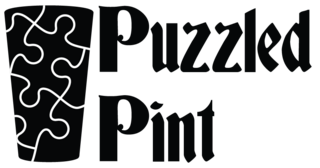
Puzzled Pint is a monthly, casual, social puzzle solving event. It is held every second Tuesday in 50+ cities around the world, with every location using the same puzzles. The global monthly attendance exceeds 3000. It follows the pattern of a conference-room style puzzle hunt, with teams receiving packets of 4-5 puzzles, usually with the answers feeding into a final metapuzzle. There is no prize.

ClueKeeper is a GPS location-aware software platform created by a group of puzzle lovers and initially released in 2013. It is an iOS and Android based app for building and playing puzzle hunts. It incorporates features of a puzzle hunt, an escape room, and augmented reality.
Cluetivity is a geolocation-based and augmented reality (AR) software platform owned by Life Action Games GmbH. Founded in 2010 by a group of scavenger hunt and tech fans, Cluetivity offers both outdoor and indoor interactive games for iOS devices. The company is currently led by CEO Michael Schiemann.











